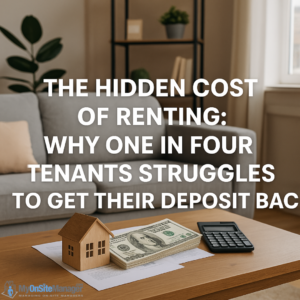Moving out of a rental should be a smooth transition: pack your things, do a final cleaning, return the keys, and wait for your deposit to come back. But for millions of renters, it’s not that simple.
According to a new study reported by AOL, one in four private-sector renters in the UK did not receive their full deposit back at the end of their tenancy. This troubling trend reveals a widespread issue in rental housing—not just in the UK, but globally—where tenants face unclear expectations, withheld refunds, and often little recourse.
What the Research Shows
-
The study surveyed 1,000 tenants across the UK.
-
24% said they did not get their full security deposit back.
-
Of those, 35% said no explanation was given for the deductions.
-
Another 33% stated they were charged for cleaning, despite leaving the unit in good condition.
-
Around 1 in 10 said their landlord claimed for damages that the renter believed were pre-existing.
While this study is UK-based, the findings mirror similar issues faced by renters in the U.S., Canada, and Australia. In many cases, renters are at a disadvantage when landlords hold both the money and the authority to determine how much is returned.
The Most Common Reasons Deposits Are Withheld
1. Cleaning Fees
The number one reason deposits are deducted is for cleaning costs. Many landlords expect a “professional standard” even if the property is in generally good condition.
Tip: Always document the condition of the unit with time-stamped photos after deep cleaning. Hiring a professional cleaner with a receipt can also strengthen your case.
2. Damage Beyond Normal Wear and Tear
There’s often disagreement between what counts as ordinary use and what is considered “damage.” A small nail hole may be acceptable, but a broken cabinet door is not.
Tip: Take detailed photos and videos during both move-in and move-out, noting all existing damages upfront.
3. Unreported Maintenance Issues
Some landlords penalize tenants for damage they claim could have been prevented if reported earlier—like a leaking pipe or broken tile.
Tip: Always report issues in writing (email/text) and keep a copy of every maintenance request.
4. Ambiguous Lease Agreements
Lease agreements sometimes contain vague or broad terms, such as “keep property in good condition,” without clear definitions. This ambiguity leaves room for interpretation—and disputes.
How Renters Can Protect Their Deposit
Here’s a step-by-step checklist for renters who want to ensure they get their deposit back:
Before You Move In:
-
Conduct a full walk-through with your landlord or property manager.
-
Take high-resolution, time-stamped photos of every room.
-
Request a signed move-in checklist documenting any issues.
During Your Tenancy:
-
Report all maintenance issues promptly, in writing.
-
Avoid unauthorized alterations (like painting walls or mounting TVs).
-
Keep receipts for any repairs or professional services you pay for.
Before You Move Out:
-
Review your lease agreement’s move-out terms.
-
Clean thoroughly—especially kitchens, bathrooms, and floors.
-
Patch small holes, change lightbulbs, and check smoke detectors.
-
Take final photos of every room once it’s empty and clean.
-
Request a pre-move-out inspection if possible.
What to Do If You Don’t Get Your Deposit Back
If your landlord withholds part or all of your deposit and you feel it’s unjust:
Step 1: Request an Itemized Deduction Statement
Most jurisdictions require landlords to explain what was deducted. Ask for receipts or photos that justify their claims.
Step 2: Dispute in Writing
Respond with your move-in/out documentation and request a reconsideration. Stay professional and detailed.
Step 3: Escalate to Mediation or Small Claims Court
If informal discussions don’t work, many cities and states offer free or low-cost mediation. As a last resort, you can file a small claims case—your photos and emails will be your strongest defense.
U.S. tenants: Check your state’s deposit laws—some require landlords to return deposits within 14–30 days and penalize them for failing to comply.
A Broken System?
Experts argue that a lack of standardized inspection procedures and vague lease terms give landlords too much discretion. With tenants already facing high rents, inflation, and cost-of-living pressures, losing a deposit—often worth $1,000 to $3,000—can be financially devastating.
Organizations and lawmakers in several countries are calling for reforms, including:
-
Mandatory use of third-party deposit protection schemes.
-
Clear move-in/out checklists.
-
Required photo evidence for deductions.
-
Tighter legal timelines and fines for violations.
Final Thoughts: Be Proactive, Not Powerless
While the system may not always favor tenants, knowledge is your greatest asset. By taking steps to document, communicate, and assert your rights, you can greatly increase the likelihood of recovering your deposit—and avoid costly surprises at move-out.
Source:
“One in four renters struggles to get their full deposit back at the end of a tenancy”
Read the full article on AOL

